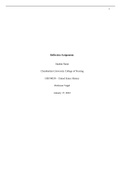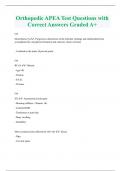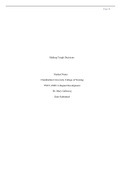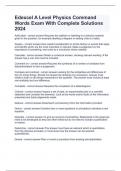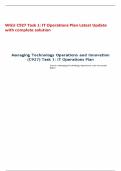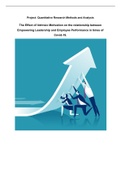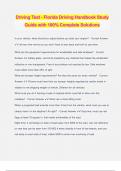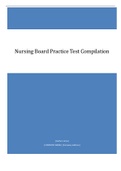CONTENT
LT01 Introduction (skip)
WK1: STUDYING PHILOSOPHY pg 3-6
Text 1 Arendt; Crisis in education (core)
LT02 Studying philosophy
WK2: MENTAL HEALTH pg 7-11
Text 2.1 Hacking; The looping effect of human kinds (core)
Text 2.2 Laing; In the divided self (mandatory)
LT03 Intro Mental Health
LT04 How to stay sane
WK3: CLIMATE CRISIS pg 12-18
Text 3.1 Catherine; Climate crisis: Facing extinction (core)
Text 3.2 Bottici; The environment is us (mandatory)
Text 3.3 Stengers; The intrusion of Gaia (mandatory)
LT05 Intro Climate crisis thinking
LT06 Climate change,
WK4: CONTESTING POLITICS pg 19-28
Text 4.1 Mouffe; For a left populism (core)
Text 4.2 Kaltwasser; Populism around the world (mandatory)
LT07 Democratic contestation
LT08 Populism
Examen Q5 pg 29-3
Examen info + overige vragen
,LT1 (Introduction) → (skip)
Course Introduction (canvas)
ECC course aims to promote philosophical reflection on contemporary challenges (education, mental
health, climate, politics).
Discussion of philosophical approach, descriptive/normative statements and role of philosophy.
Title Essential Contemporary Challenges
Predicament in title because ‘essential’ and ‘contemporary’ do not go together. Essential has
philosophical concept (necessary/forever true) whereas contemporary is temporal/contigent
(belonging to the present)
Challenges not problems
Philosophy is about challenges and how to think about these, not coming up with solutions.
● Instrumental thinking: reducing everything in life to a configuration of problems and solutions
● Accepting challenges is not problem solving but embracing the complexity of a problem.
● Requires stirring thinking: no analysis/criticism/irony but mindfulness and relativism in a
deeper sense of the world.
All essential contemporary challenges are actually existential challenges. → philosophical
methodology = attitude.
ECC: 4 themes
1. Studying philosophy
- What is a ‘challenge’? ‘Essential contemporary challenges’, why we get up in the
morning, the ‘twenty-first century’
- How is education instrumentalized and how should we interpret education? What is
education ‘about’?
2. Mental health
- What is it to be mentally (un)healthy? What is the importance of an existential
perspective? How should we think about normality?
3. Climate crisis
- How does ecology impact our thinking and acting? How should we conceive of
nature/culture? What is to be done?
4. Contesting politics
- How should we conceive of politics today? What is populism and where does it
come from?
, WK1 Studying Philosophy - Crisis in education
Text 1 - (core) Arendt, The crisis in Education
Literatuur: Arendt, H. (1961). The Crisis in Education, in: Between past and future: six exercises in
political thought. New York: Penguin Books, 173-196.
(Samenvatting: https://www.youtube.com/watch?v=cAENdNnSrzc )
Part I (pg 1-8)
> Crisis in education in modern world, characterised by decline of school system and disappearance
of common sense.
● Crisis as opportunity to explore the essence of the matter, back to the questions without
prejudices. (only becomes disaster when using prejudices → avoids reality so no reflection
possible)
● Though clear problem, still impossible to completely isolate the essential element from
circumstances
> Focus on crisis in education in America
● Novus Ordo Seclorum = a new order of the World (immigration!) (founding new world against
the old to get rid of poverty and oppression)
○ Continuous immigration influences politics, difficulty melting together most diverse
ethnic groups through education and americanization of children/parents.
○ These immigrants are guarantee to the country that it represents the new order (not
just needing immigrants to populate the land).
● Enthusiasm pathos of the new (thus also the newborn) which caused education (influenced
by Rousseauism) to become instrument of politics and political activity seen as form of
education
○ According to education logical to start a new world with newborns but according to
politics, the adult should have superiority (instead of equals). → education NOT part
of politics which deals with those already educated.
○ ‘It is in the nature of human condition that each new generation grows into an old
world; to prepare a new generation for a new world would mean taking away their
chance at the new (anything proposed by adults is older than the newcomers) → not
the case in america
○ In America: education has political role of americanizing children and parents which
creates illusion of building new world. Standards lag behind:
■ Not simply because young and not yet caught up with standards of old world
■ Crisis in education shows the failure of progressive education + problems
handling demands of mass society.
■ Concept of equality aggravated crisis → high school continuation of primary
school (democratic instead of meritocratic)
, Part II (pg 9-13)
> Measures that brought on the crisis are based on 3 assumptions:
1. Existence of child's world → autonomous society formed among children and governed by
them
○ Adult lost contact with child: authority that tells individual child what (not) to do lays
within the child group itself
○ Child worse of: authority of group stronger than that of individual person→ no
rebellion → hopeless minority
■ Through emancipation from authority of adults, child is not freed but
subjected to more terrific authority of majority
2. Teaching → pedagogy (approach to teaching) developed into a science of teaching in general
and emancipated from the actual material to be taught.
○ A teacher is trained in teaching (can teach anything), not in mastery of particular
subject → just a little ahead in knowledge → non-authoritarian teacher
3. Modern theory of learning → ‘one can know and understand only what one has done himself’
○ learning is substituted by doing
○ No importance attached to the teacher's mastering of the subject, no passing on of
‘dead knowledge’ but instead demonstrating how it is produced.
■ Limited in learning when substituted doing for learning and playing for
working (obliterates distinction between play and work)
■ It removes the habit (gradually more work, less playing) that prepares the
child for the adult world, in favor of the autonomy of the world of childhood
Part III
> Reflection on the role of education in civilization: what was learned from the crisis for the essence of
education?
● Education is elementary for human society, a crisis in education reflects a more general
crisis/instability in modern society.
○ Society continually renews itself through the birth of human beings → new to the
world + in a state of becoming.
○ Responsibilities of education: for the life/development of the child + continuance of
the world → preserving + protecting the new/child and the old/world
● Modern education → prejudice private/public life
○ destroys necessary conditions for vital development and growth despite aim to
emancipate child and free them from adult world -derived standards
○ Modern society discards the distinction private/public→ makes it harder for children
(who require security of concealment to mature undisturbed).
■ School is interposing institution that enables transition from private domain of
home to public world
■ Educators as representatives of a world for which they must assume
responsibility.
■ Teachers should know the world and instruct the students and authority rests
on his assumption of responsibility for this world..
○ Adults can discard authority by refusing to assume responsibility for the world in
which they brought child
● Conservatism in education →to preserve newness of child and introducing it to old world
○ Conservatism (conservation) is essential in education→ protecting new/child against
old/world (and other way around). To preserve the new, one has to preserve the old.
○ Conservatism is only good for education (relation adult/child) and not in politics
(adults should be equal)


